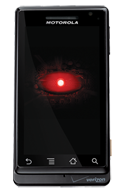With 'Droid' branding, Verizon takes platform-dominant position

Is Verizon Wireless ahead of the curve, by marketing all of its Droid phones as one brand? There's the Motorola Droid, the HTC Droid Eris, the HTC Droid Incredible and two more Motorola Android phones that Verizon will add to its franchise next month. With so many products, all powered by Google's Android software, is the strength of each manufacturer’s brand diminished, or is the benefit of joining forces so enormous that it doesn’t matter?
To find out, I talked to branding expert Rob Frankel, who makes his calls on an un-smartphone from Sprint.
What do you think about Verizon’s decision to brand all its Google Android phones “Droid,” regardless of the manufacturer?
I think you’re making a conscious decision to lead with a platform rather than a hardware strategy, which is immediately going to make the Verizon product appear to have wider and broader appeal to market. When you think about it, it makes a lot of sense because there’s a lot of money behind Droid as a platform. Whoever is pushing Droid—if Verizon just piggybacks on that, they’re saving hundreds of millions of dollars to drive home a point. It’s a smart bit of thinking and goes after my own personal style: Why spend your own money when someone else is paying for advertising?
Is it a smart idea for Verizon to use multiple devices to create a brand that rivals the iPhone?
They’re creating a platform-dominant position. How many phones can you get the iPhone platform on? Just one. With a Droid offering you can get it on any of these phones. If you are not sold on the iPhone, there’s a whole range of things you can do, and a lot of options. It makes a lot of sense. Of course there are rampant rumors that Verizon will get a CDMA [version of the] iPhone. That will put the nail in the coffin.
What are the downsides for Motorola and HTC—especially since they make other Android-powered phones, both on Verizon and other networks?’
The downside is probably the same for Verizon and the carriers that adopt the strategy—your brand is going to take a back seat to the platform. So the less integral part you play in supporting the platform, the more expendable you will be perceived to be. They become secondary and tertiary brands. Eventually, it will become: “I don’t care if it’s a Motorola chip in there; does it have Droid?”
Does Verizon’s approach fragment the overall Android offering?
From a 100,000-foot view, if you really step back, it’s like when people say, “I need a cell phone.” That’s the first thing they do. Then they look at calling plans and get more granular, and that’s what this is analogous to. Now they say, “I like the Droid platform,” and then there’s a lot of different ways to do Droid. So no, the brand of carrier is dissolving into the wallpaper here. They’re realizing--and iPhone gets a lot of credit for this—that it’s function and user convenience that’s leading the way here.
Also, telecom companies are generally held in the same or lower esteem as used car salesmen. You never hear, “Man, I really love that AT&T.” It may be a real smart move to take second seat from the carrier manufacturer as opposed to the platform.
Is it financially sound to license the name “Droid” from George Lucas and Lucasfilm Ltd.?
Are you kidding? Of course it is. Here’s what attests to George Lucas’s smarts: To this day, Lucas is the only producer in the business who successfully negotiated with the studios for all the rights to all the Star Wars stuff that he did on the front end. After Star Wars, no one has ever been able to do that. It proved so freakin’ profitable for the guy. There were a lot of really angry and jealous people.
This is a guy who knows what it’s all about. I wouldn’t be surprised—but I have no idea--if he helped them calculate the value of the [Droid] license, because he really knows what he’s doing.
It’s usually a lot more cost effective to license an old brand than create a new one. It’s not the best licensing job I’ve ever seen, but it’s not going to hurt them. I don’t think it will help them as much as they think it would, but they’ve managed to cobble something together that’s pretty appealing for the audience they’re going after, which, from what I’d guess, is way male-skewed.
Images: Verizon Wireless
